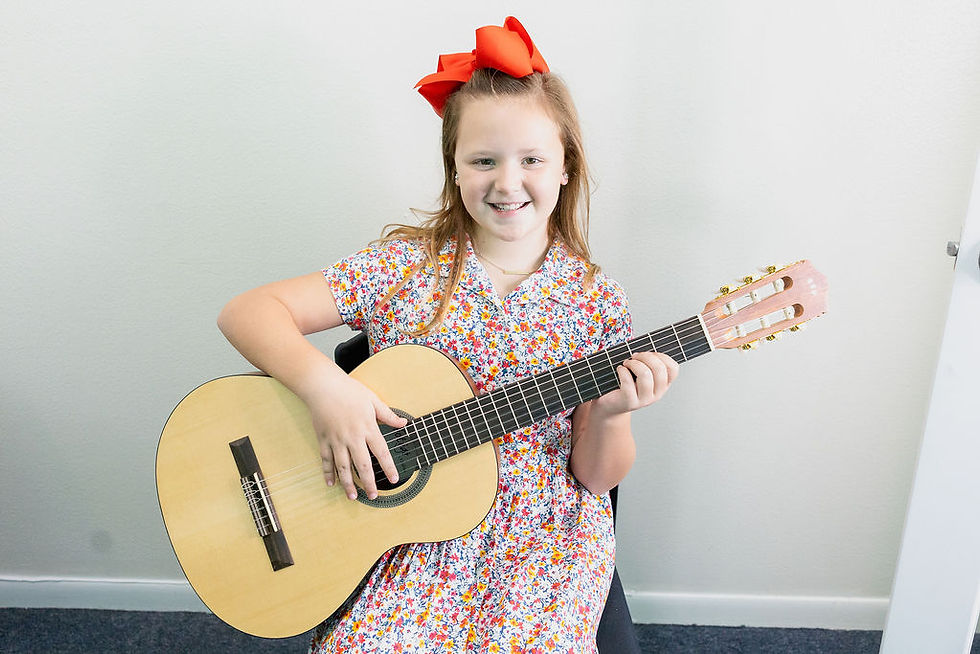All You Need to Know About Guitar Lessons for Children and Adults
- Ines Scudellari
- May 19, 2025
- 4 min read
Updated: Aug 19, 2025

At Kingwood Arts Academy of Music in Kingwood, Texas, we believe music can be life-changing, and guitar lessons are one of the most exciting and rewarding ways to start that journey. Whether you’re a parent considering lessons for your child or an adult ready to pick up a new hobby, learning guitar opens doors to creativity, confidence, and pure joy.
In this complete guide, we’ll explore everything you need to know about guitar lessons for both children and adults. From benefits and readiness to practical tips and local options, this is your one-stop resource for starting your guitar adventure.
🎸 Why learn guitar? The timeless appeal
The guitar is one of the most versatile and beloved instruments worldwide. It’s approachable, portable, and perfect for a wide range of musical styles — from classical and jazz to pop and rock.
Beyond the fun factor, learning guitar offers countless benefits:
Builds discipline and patience: Mastering chords and songs takes practice and
perseverance.
Boosts cognitive development: Improves memory, coordination, and problem-solving
.skills.
Encourages self-expression: Students can channel emotions and creativity
through music.
• Provides social opportunities: Playing with others or performing builds
confidence and friendships.
Whether you’re a child exploring a new hobby or an adult revisiting an old dream, the guitar is an excellent choice.
👧 🎵 Children’s Guitar Lessons. At what age is it best to start?
A common question we hear at Kingwood Arts Academy is, “When should my child start guitar lessons?” While each child is unique, most can start around ages 5 to 7, depending on their hand strength and attention span. Younger children might benefit more from general early childhood music classes first.
Parents often wonder if they should invest in a guitar immediately. While owning a guitar encourages practice, we also offer loaner instruments for trial periods. This helps your child decide if the guitar is the right fit before making a purchase.
👉 Read more: When can kids start taking guitar lessons?
Do I need to buy a guitar right away?
Parents often wonder if they should invest in a guitar immediately. While owning a guitar encourages practice, we also offer loaner instruments for trial periods. This helps your child decide if the guitar is the right fit before making a purchase.
Guitar lessons for ADHD kids
Music can be a powerful tool for children with ADHD, offering an outlet for focus and energy. Structured guitar lessons provide routine and help build self-confidence in a supportive environment.
👉 Read more: Do guitar lessons benefit an ADHD kid?
Preschool guitar lessons
If your child is under five and shows an interest, it's essential to consider their readiness. Younger students typically begin with musical play, rhythm games, and basic finger exercises before progressing to formal lessons.
Absolutely not! Adults of all ages successfully learn to play guitar. Many of our adult students at Kingwood Arts Academy start with zero experience and discover new passion and joy through music.
👉 Read more: Are guitar lessons worth it for adults?
Overcoming fear and busyness
Adults often feel intimidated or worry about finding time. We understand busy schedules, so we offer flexible lesson times and customized practice plans to make learning enjoyable and stress-free.
👉 Read more: Can adults with a busy schedule take guitar lessons?
Frequency and consistency
Consistency is more important than perfection. Most adults take one lesson per week, but some prefer bi-weekly or more intensive sessions. Regular short practices at home are key to steady progress.
👉 Read more: How often should adults take guitar lessons?
Teaching approach for adults
Adults benefit from a tailored approach that respects their learning style and goals — whether it’s playing favorite songs, learning theory, or jamming with friends.
👉 Read more: https://www.kingwoodartsacademy.com/guitar-lessons
🎵 Beginner Guitar Lessons for All Ages
Acoustic or electric?
Beginners often ask, “Should I start on acoustic or electric?” The answer depends on personal style and comfort. Acoustic guitars build finger strength and are portable, while electric guitars are easier to press and can be less painful at first.
How many lessons do I need?
Progress depends on your goals and practice habits. Many beginners start seeing results after 3–6 months of weekly lessons, but learning is an ongoing journey.
👉 Read more: How many guitar lessons should a beginner take?
Finding lessons near you
Choosing the right teacher or academy makes a big difference. Local options, such as Kingwood Arts Academy, offer personalized guidance and community support.
👉 Read more: Where can I take guitar lessons near me?
What should you learn first?
Most beginners start with basic chords, strumming patterns, simple songs, and understanding rhythm.
👉 Read more: What should a guitar beginner learn first?

🌟 Choosing the right program
At Kingwood Arts Academy, we offer:
• Private guitar lessons: Personalized attention and customized curriculum.
• Group classes: Great for social learning and beginners who enjoy group
dynamics.
• Hybrid/online options: Flexible for busy schedules.
Whether you’re 5 or 55, we tailor each lesson to your needs, goals, and musical dreams.
🎸 Start your guitar journey today!
Learning guitar is an adventure filled with creativity, growth, and fun.

What parents and students are saying:




Ready to start?
Click HERE to request information.




For aspiring guitarists, an interactive tool to master guitar playing can be a fantastic supplement to traditional learning. Online virtual guitars often show you chord diagrams, allow you to hear how they sound, and even guide you through playing simple songs. This visual and auditory feedback can be really helpful for understanding finger placements and chord transitions. It’s also great for experimenting with songwriting ideas or for quickly looking up a chord when you don't have your instrument handy. It makes learning more engaging and accessible.